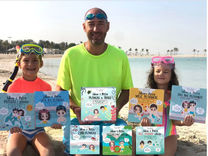Blog guest: Urška Potočnik
- Mar 18, 2019
- 3 min read
Updated: Apr 1, 2020
She used to swim as a child, and then she made a break. Seven years later, she came back to swimming. Her love for swimming was developed by her dearest coaches Jožica and Žarko Govedarica. As a national team swimmer of Slovenia, Urška Potočnik, was a finalist in many world and European championships, in the 50m backstroke, and a national record holder of Slovenia for the 50m backstroke (25m pool) and the 50m dolphin (50m pool). For the Swimming Dad as a #Blog guest, Urška Potočnik explains the misconceptions and truths about the world of swimming and the things parents and kids should be aware of before jumping into the pool. Having completed her swimming career, Urška devoted herself to coaching young swimmers. Today, her swimmers are finalist in the EYOF (medal and finals), at the MEP (finals) and MSP (semi-finals).
While still swimming, what misconceptions about swimming and swimmers did you come across?
There are lots of them. One of the misconceptions I heard was: If you swim you will have ugly wide shoulders. Hehe, from the perspective of a female swimmer, for me personally, the wide “swimming” shoulders are the most beautiful ones. If you ask me, those are athletes who are actually the fittest ones. Another misconception of adults is that swimmers only swim “up and down”. One should know how to swim not only using their bodies, but using their head, and thinking about the technique, tactics, and turns all the time and under a great pressure!
What are the most frequent questions children make about swimming? Do you always have right answers for them?
Swimmers don’t make many questions, but when they do, I always find an answer right for their age. This is why I give my best to explain every single training and exercise, so that it makes sense to them. To be honest, parents are those who usually ask questions, but that’s another story. When it comes to kids, there are always many funny stories. One of the swimmers has just recently made me laugh with tears when he had tried to explain how he could swim in shallow, but not in deep water. That was, of course, his explanation, because he had a great fear of depth. In such cases, children should be approached with a story from their own perspective. With a good story, I convinced him that he could easily get into and swim in the deep water as well. How? I just divided the deep water into a layer of shallow + another layer of shallow water, meaning that the deep water was consisted of several layers of shallow water. It sounds ridiculous, but it worked. He agreed with me and since then there has been no fear of the depth.
What are the things children and parents should be aware of when entering the world of swimming?
Swimming is a great sport. On the other hand, it is too demanding if you decide to devote yourself to a hard training. Today, the young want to make an overnight success. It takes years and kilometers of swimming to be successful later in the senior competition. A desire is not enough. A great support of the people around you (family) also counts. On the other hand, hard work and sacrifice will help you later in life (acquired work habits). You must respect swimming as a sport. Apart from the results and the success, swimming has just more than that, your friends for your team or the national team who are your lifetime friends.



























































Comments